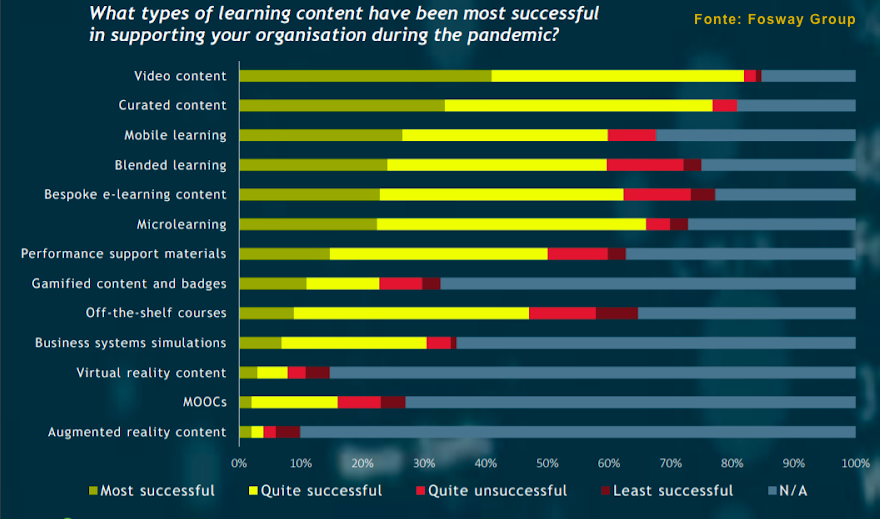In the past year, as we all know, the Covid-19 emergency has led to profound changes in all corporate organizations. The digital transformation in work contexts has been one of the main turning points triggered by the Covid-19 pandemic, and has entailed the need to update traditional forms of training.
As a consequence, many Corporate training managers have inevitably had to convert traditional, usually face-to-face training, into more digital and interactive learning.
But be careful…
Digitalizing corporate training has entailed profound changes to the point that it could be said that L&D may no longer be the same.
Table of Contents
- Is it really so? How has Corporate Training changed following the Covid 19 Pandemic?
- Let’s go through the key points of the Fosway Group research together:
- Continuing to read this research, other interesting data emerges, which is worth paying attention to:
- What can we learn from these results?
- In conclusion
Is it really so? How has Corporate Training changed following the Covid 19 Pandemic?
Fosway Group, one of Europe’s most authoritative HR Industry Analysts, conducted research analyzing the impact that the Covid-19 pandemic had on corporate Learning & Development.
The focus was on understanding how changes in the world of work and learning have influenced L&D budgets and spending, but above all to understand what has worked or not in supporting people during this period of uncertainty.
The research results showed that the Digital Transformation has offered important opportunities for corporate training.
Anyway, it has also highlighted the difficulty that many organizations have encountered in adopting a strategic and innovative approach to the design of modern corporate training. This is because adapting to change and choosing the best solutions for training in line with company values and needs is neither easy nor immediate.
In this post, we have tried to identify the key points of this interesting report – which we invite you to download and read carefully, trying to contextualize it in your organization.
Click here to download the research.
Let’s go through the key points of the Fosway Group research together:
- After the pandemic, only one in four companies was able to develop and adapt its L&D strategies to changes, while 42% had difficulty coping with the evolution brought about by the crisis.
- 59% of workers considered the approach adopted by their organization regarding corporate training to be immature. According to the study, a delay in digitalizing learning would result in a 3 times greater likelihood of not being able to manage crisis situations.
- To respond to the pandemic, 94% of L&D professionals declared that they had changed their learning strategies in organizations, i.e. 2 out of 3 implemented significant changes regarding training content and their use.
- 82% of those surveyed reported that the demand for digital learning has increased from senior stakeholders, while 71% reported an increase in the demand for digital educational content from students themselves.
- With the pandemic in progress, 21% of companies implemented Digital Learning solutions or extended the number of licenses for software and technologies already in use.

- The training content that was most successful in supporting companies during Covid-19 were video content, followed by “curated” content. According to those surveyed, custom or catalog courses and blended learning were less successful in terms of effectiveness.
We find this last point to be really interesting, as it confirms the importance and effectiveness of Content Curation within an L&D strategy – to promptly respond to the needs of employees and the organization.
Curation is the art/science of identifying the best information for the organization and providing context and order to it. – Bersin by Deloitte
To sum up, selecting, organizing, and contextualizing existing educational content and resources (both catalog and ad hoc) is essential for any modern corporate training strategy, able to promptly respond to company needs and even emergency situations.
Continuing to read this research, other interesting data emerges, which is worth paying attention to:
- There has also been a major shift in terms of collaboration: employees, working remotely and in virtual teams, have developed a strong sense of cooperation. To maintain constant interaction, 84% of L&D Managers consider it essential to integrate digital training within company platforms such as Microsoft Teams, Slack, and Trello.
- The so-called Learning Experience Platforms (LXPs), Virtual Classrooms Training, specialist platforms for learning (Collaborative Learning), and LMS platforms were rated as the most successful systems in supporting organizations during the pandemic.
- Finally, according to the research, only 5% of L&D professionals think that their learning strategy, investments, and resources will return to what they were before the pandemic began.

What can we learn from these results?
First and foremost, the unmistakable impact of the Digital Transformation on corporate training. E-learning and Digital Training have already been part of corporate L&D strategies for some time. For this reason, it would be impossible to deny that the Pandemic has contributed to accelerating the Digital Transformation in the learning sector and the push for the adoption of new training technologies.
In addition to this, it’s clear that, in order to develop blended training, Companies must outline a solid and modern training strategy that involves the digital and allows them to be ready for any situation – crisis or not.
At last, we can also state that, even in light of what happened in 2020, organizations with a mature approach to digitization have twice the likelihood of effectively dealing with difficult and changing situations.
In conclusion
Digital transformation is an opportunity to be seized and constantly invested in, not only for the future, but above all hic et nunc – to have the necessary tools and skills…at the speed of need.
#neverstoplearning


